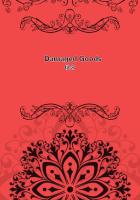FRIENDLY COUNSELS
I felt strongly tempted, at times, to enlighten my mother and sister on the real character and circumstances of the persecuted tenant of Wildfell Hall; and at first I greatly regretted having omitted to ask that lady's permission to do so; but, on due reflection, I considered that if it were known to them, it could not long remain a secret to the Millwards and Wilsons, and such was my present appreciation of Eliza Millward's disposition, that, if once she got a clue to the story, I should fear she would soon find means to enlighten Mr. Huntingdon upon the place of his wife's retreat.
I would therefore wait patiently till these weary six months were over, and then, when the fugitive had found another home, and I was permitted to write to her, I would beg to be allowed to clear her name from these vile calumnies: at present I must content myself with simply asserting that I knew them to be false, and would prove it some day, to the shame of those who slandered her. I don't think anybody believed me: but everybody soon learned to avoid insinuating a word against her, or even mentioning her name in my presence. They thought I was so madly infatuated by the seductions of that unhappy lady that I was determined to support her in the very face of reason; and meantime I grew insupportably morose and misanthropical from the idea that every one I met was harbouring unworthy thoughts of the supposed Mrs. Graham, and would express them if he dared. My poor mother was quite distressed about me; but I couldn't help it--at least I thought I could not; though sometimes I felt a pang of remorse for my undutiful conduct to her, and made an effort to amend, attended with some partial success--and indeed I was generally more humanized in my demeanour to her than to any one else, Mr. Lawrence excepted. Rose and Fergus usually shunned my presence; and it was well they did, for I was not fit company for them, nor they for me, under the present circumstances.
Mrs. Huntingdon did not leave Wildfell Hall till above two months after our farewell interview. During that time she never appeared at church, and I never went near the house: I only knew she was still there by her brother's brief answers to my many and varied enquiries respecting her.
I was a very constant and attentive visitor to him throughout the whole period of his illness and convalescence; not only from the interest I took in his recovery, and my desire to cheer him up and make the utmost possible amends for my former `brutality,' but from my growing attachment to himself, and the increasing pleasure I found in his society--partly, from his increased cordiality to me, but chiefly . on account of his close connection--both in blood and in affection--with my adored Helen. I loved him for it better than I liked to express; and I took a secret delight in pressing those slender, white fingers, so marvellously like her own, considering `he was not a woman, and in watching the passing changes in his fair, pale features, and observing the intonations of his voice--detecting resemblances which I wondered had never struck me before. He provoked me at times, indeed, by his evident reluctance to talk to me about.his sister, though I did not question the friendliness of his motives in wishing to discourage my remembrance of her.
His recovery was not quite so rapid as he had expected it to be: he was not able to mount his pony till a fortnight after the date of our reconciliation; and the first use he made of his returning strength, was to ride over by night to Wildfell Hall, to see his sister. It was a hazardous enterprise both for him and for her, but he thought it necessary to consult with her on the subject of her projected departure, if not to calm her apprehensions respecting his health, and the worst result was a slight relapse of his illness; for no one knew of the visit, but the inmates of the old Hall--except myself, and I believe it had not been his intention to mention it to me, for when I came to see him the next day, and observed he was not so well as he ought to have been, he merely said he had caught cold by being out too late in the evening.
`You'll never be able to see your sister, if you don't take care of yourself,' said I, a little provoked at the circumstance on her account, instead of commiserating him.
`I've seen her already,' said he, quietly.
`You've seen her!' cried I, in astonishment.
`Yes.' And then he told me what considerations had impelled him to make the venture, and with what precautions he had made it.
`And how was she?' I eagerly asked.
`As usual,' was the brief though sad reply.
`As usual--that is, far from happy and far from strong.'
`She is not positively ill,' returned he; `and she will recover her spirits in a while I have no doubt--But so many trials have been almost too much for her. How threatening those clouds look!' continued he, turning towards the window. `We shall have thunder showers before night, I imagine; and they are just in the midst of stacking my corn. Have you got yours all in yet?'
`No.--And Lawrence, did she--did your sister mention me?'
`She asked if I had seen you lately.'
`And what else did she say?'
`I cannot tell you all she said,' replied he with a slight smile, `for we talked a good deal, though my stay was but short; but our conversation was chiefly on the subject of her intended departure, which I begged her to delay till I was better able to assist her in her search after another home.'
`But did she say no more about me?'
`She did not say much about you, Markham. I should not have encouraged her to do so, had she been inclined; but happily she was not: she only asked a few questions concerning you, and seemed satisfied with my brief answers; wherein she showed herself wiser than her friend--and I may tell you too, that she seemed to be far more anxious lest you should think too much of her, than lest you should forget her.'
`She was right.'
`But I fear your anxiety is quite the other way, respecting her.'















